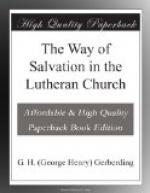Our seventh objection is closely connected with the last. Where there is so much indifference to the Truth as it is in Jesus, that it often amounts to open contempt, we cannot expect any provision for teaching His saving truths to men. Hence we find but small provision, if any, for doctrinal instruction in the revival system. Those who are expected to be gathered in, converted and brought to Christ, are not first instructed. They do not learn what sin is, what Grace is, and how it is communicated and applied. They are left in ignorance of the great doctrines of sin and salvation. They have the most imperfect conception of God’s Way of Salvation. And yet they are expected to enter upon that way, and walk in it. They are exhorted to be converted, to get religion, and to believe, while it is seldom, if ever, made clear what all this means, and how it is brought about.
Surely it is not necessary that we should show that if ever a person needs to act intelligently—if ever he needs to know exactly what he is doing, why he is doing it, and what is involved in so doing—it is when he is acting in the interests of his eternal salvation. Then, if ever, he should act understandingly and honestly. And for this he needs instruction. We have shown elsewhere that this is God’s way, the Bible way, the way of the early Church, the way of the great Protestant Reformation, and the way of our Church of the Reformation to this day.
We therefore object to this modern revival system, because it has largely supplanted the old time systematic and thorough indoctrination of the young. And, as we have elsewhere said, we are convinced that, just in proportion as the youth are uncatechised and uninstructed in the great doctrines of God’s Word regarding sin and Grace, in that proportion will doubt, skepticism, unbelief and infidelity infect them, and lead them into the paths of the destroyer.
Our eighth objection to this modern revival system, is that it is so largely built up on the excitement of the feelings. The first and great object of the revivalist seems to be to work directly on the emotional nature of his hearers. If he can stir the depths of the heart until it throbs and thrills with pent-up emotions, if he can play upon its chords until they vibrate and tremble under his touch, until its hidden chambers ring again with responsive longings, until at last the repressed intensity breaks forth in overpowering excitement, he is considered a successful revival preacher. To reach this end the preaching is made up of exhortations, anecdotes and appeals. There are touching stories, calculated to make the tender-hearted weep. There are thrilling and startling experiences, calculated to frighten the more hard-hearted. There are lively, emotional songs, with stirring music, calculated to affect the nervous system and bring about strange sensations. And when the feelings are aroused, when the excitement is up, the hearers are urged to come forward, to go to the inquiry-room, to stand up, or do something to show that they are ready to take the decisive step.




